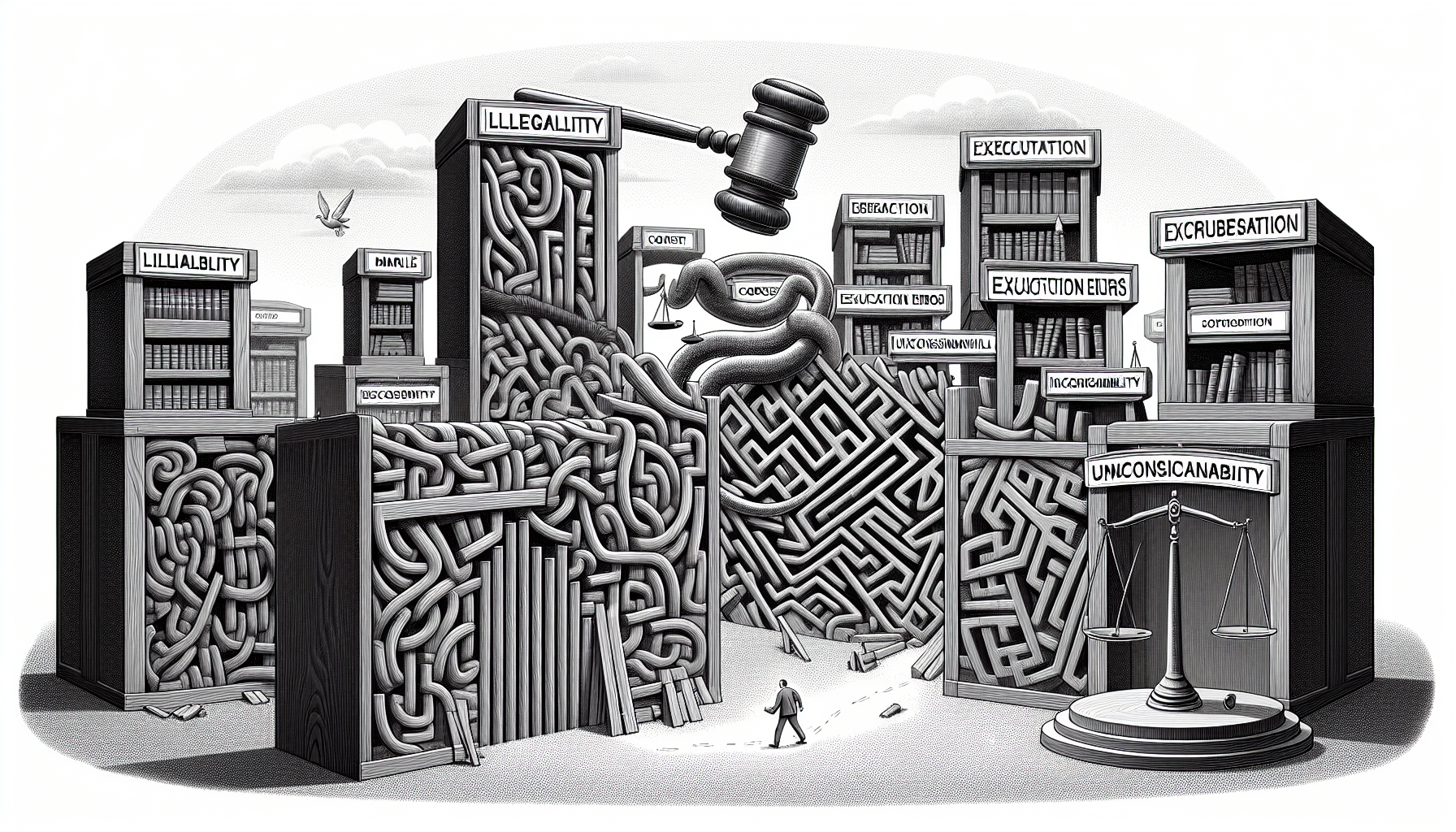Digital LawyerWed May 08 2024
Unlocking the Enforceability of Contract: Your Essential Guide to Valid Agreements
Can you trust that your contract will stand up in court? The enforceability of contracts is foundational to any agreement’s validity. This article delves directly into what makes a contract enforceable, including the five must-meet conditions such as clear terms and mutual agreement, and highlights key roadblocks that might render your contract void. Journey through […]
Can you trust that your contract will stand up in court? The enforceability of contracts is foundational to any agreement’s validity. This article delves directly into what makes a contract enforceable, including the five must-meet conditions such as clear terms and mutual agreement, and highlights key roadblocks that might render your contract void. Journey through the legal landscape with us as we clarify how to secure sound agreements that hold legal weight.
Key Takeaways
Enforceable contracts must consist of six key elements: offer and acceptance, intention to create legal relations, consideration, capacity, and legality to be considered valid and legally binding.
Barriers that can render a contract unenforceable include lack of capacity by one or more parties, illegality of terms, unconscionability due to unequal bargaining power, and errors during the contract’s execution.
Digital solutions such as contract management software and e-signatures are crucial for streamlining the contract creation process while ensuring agreements meet legal standards for enforceability.
Key Elements for Enforceable Contracts

At the core of every legally binding contract is a foundational framework that consists of six critical elements, essential for establishing an agreement as enforceable under law. These key aspects are:
Offer and acceptance
Intention to create legal relations
Consideration
Capacity
Legality
Each element acts as a pillar in constructing not just an enforceable contract, but also one that is recognized by law as a valid and legally enforceable agreement.
The meticulous attention to these specifics converts informal commitments into contracts with legal obligations, ensuring all parties involved adhere strictly to the agreed-upon conditions.
Offer and Acceptance
In the domain of contract law, an offer acts as an anchor, transforming ephemeral promises into substantive commitments. It serves as the first step in creating a potential agreement by presenting a definitive proposition that establishes the groundwork for mutual intention to form a binding contract when acceptance occurs.
Acceptance is then defined as the clear and unambiguous concurrence with the terms proposed by an offer. This act cements a dual-sided promise which facilitates Bargaining and exchange of considerations—a fundamental process in upholding contract law’s principle concerning agreements grounded on offers and subsequent acceptances.
Intention to Create Legal Relations
At the heart of any contract lies the essential ingredient: intention. This unspoken yet pivotal force tightly stitches together both parties in an agreement, transforming their exchange from a simple gentleman’s understanding to a pledge that is acknowledged and upheld by legal standards. Within business dealings, such intention is typically inferred, thereby separating contracts that are enforceable from casual social interactions.
It is precisely this mutual resolve to establish legal relations which births a legally enforceable contract. This ensures clarity between the parties involved—that they consent to be held accountable under law for their statements and deeds regarding the agreement.
Consideration
The essence of a contract is consideration. It’s the reciprocal exchange that injects life into an agreement. Consideration represents the value transferred between parties and may manifest as a service, payment, or even a commitment to abstain from doing something. When considering past actions or gifts provided prior to the present deal, known as past consideration, they fail to qualify for creating a new legally binding agreement.
Consideration fortifies an agreement by ensuring that every party involved gains some measure of value in return for their pledge. This exchange serves as concrete evidence that each participant has invested interest—a mutual contribution that cements their arrangement into a valid and legally binding contract.
Capacity
One must hold the legal capacity to participate in the creation of a contract, signifying that an individual is equipped with the necessary understanding to grasp their agreement’s consequences.
Although most adults are granted complete freedom to engage in agreements, minors and individuals with certain mental disabilities may not be considered as having enough capacity under law to be legally bound by their contractual commitments.
Legality
In the vast arena of contract law, the concept of legality is a principal actor. For a contract to be valid, it must conform with local laws and stipulations that neither demand illegal activities nor engage in transactions involving banned items. Compliance with legal standards ensures that a contract remains enforceable and unaffected by any links to illicit conduct.
As the moral guide for contracts, legality directs them clear of pursuits that conflict with public policy or undermine societal well-being.
Common Barriers to Contract Enforceability

Navigating the complexities to form a legally enforceable contract can be challenging due to several potential stumbling blocks that may compromise the agreement’s legitimacy. Factors contributing to this include:
A participating party not possessing legal capacity
Terms within the contract being illegal
A lack of equitable bargaining power leading to unconscionability
Mistakes made in executing the contract
Any of these factors might lead to a situation where an otherwise binding agreement becomes non-enforceable, lacking any authority for court enforcement.
To preserve the enforceability and integrity of a contract, it is critical that these obstacles are meticulously managed and overcome.
Lack of Capacity
If a party to a contract is found to be incapable, due perhaps to their age, intoxication, or inability to grasp the terms of the agreement, this can severely undermine the contract’s enforceability. The law steps in under these circumstances with protective measures because it recognizes that such individuals may not fully appreciate or agree voluntarily to the obligations laid out in the contract.
Illegality
When a contract is entwined with actions that defy the law or contravene public policy, its enforceability is nullified. Agreements requiring parties to partake in legally prohibited activities will find no favor or support within the judicial system, as it strives to prevent itself from being an accessory in sustaining such unlawful agreements.
Unconscionability
An agreement that disproportionately benefits one party can be deemed unconscionable, which reflects a significant level of unfairness within the contract. These types of contracts typically result from a pronounced disparity in bargaining power where the weaker party’s deficiency in understanding, expertise, or resources coerces them into an agreement without full comprehension or consent.
In such instances, legal intervention seeks to rectify inequalities by declining to enforce agreements that are strikingly biased and offend our sense of justice due to their lopsided terms.
Execution Errors
If a contract is not properly executed, it can be rendered vulnerable despite its meticulous drafting. Omissions like absent signatures or insufficient witnessing can lead to an agreement being declared void. Such often-neglected technical errors carry considerable legal repercussions, underscoring the importance of precision during the concluding steps of creating a legally binding contract.
Ensuring Enforceable Contracts with Gaffney Zoppi

Navigating the intricacies of contract law, Gaffney Zoppi stands out as a source of expert guidance, dedicated to meticulously drafting contracts that hold up under legal examination. They provide an array of services designed specifically for diverse clientele needs and steadfastly commit themselves to establishing enforceable agreements.
For both entrepreneurs and individuals, Gaffney Zoppi offers extensive sector-specific knowledge to ensure your contracts are embedded with all necessary components required for them to be legally binding and enforceable. Their expertise is vital in guaranteeing that each agreement you enter into meets the stringent requirements laid down by contract law.
Bespoke Contracts
Crafting a custom-made contract is comparable to designing an exquisite suit—it needs to be meticulously tailored to meet the distinct demands of the client with utmost accuracy. Gaffney Zoppi masters this skill, investing time to deeply comprehend the individual business environment and aims of every client. The outcome is a written contract—a legal ensemble—carefully fashioned to bolster the client’s ambitions while safeguarding their interests.
By working together and utilizing pivotal initial documents such as heads of terms and letters of intent, Gaffney Zoppi establishes a foundation for agreements that surpass what clients anticipate rather than just fulfilling them.
Contract Review
A meticulous examination of a contract is paramount, playing an essential role in confirming both its equitable nature and adherence to legal standards. The services for reviewing contracts offered by Gaffney Zoppi are rigorous and detailed, meticulously scrutinizing every section and element to uncover any hidden risks or opportunities for improvement.
Serving a wide array of clients that includes private individuals as well as business owners, the seasoned lawyers at the firm deliver an exhaustive assessment designed to guarantee that the agreement is balanced, clear-cut, and robust enough to endure any legal scrutiny.
Fast Turnaround Times
Understanding the critical importance of time in both business and personal matters, Gaffney Zoppi is dedicated to providing prompt and attentive service. Clients are guaranteed quick responses for contract reviews along with consistent communication that matches their requirements for speedy, yet informed decision-making.
Such efficient services reassure clients that they can move forward assuredly, aware that their contractual concerns are being managed by proficient hands.
Digital Solutions for Creating Enforceable Contracts

In today’s digital era, technology significantly influences the formation and maintenance of enforceable contracts. Innovations like contract management systems and e-signatures provide new ways to simplify how contracts are drafted and finalized, while also confirming that these agreements adhere to the requisite legal criteria for enforcement.
Utilizing these technological advancements enables parties involved in a contract—including any additional party—to navigate the realm of contractual agreements with improved efficiency and ease.
Contract Management Software
Modern contract management software acts as an advanced recorder and organizer for agreements, bringing a new level of accuracy to the task. This electronic system boosts operational productivity by providing:
Tailored automation that speeds up the various stages of a contract’s lifecycle
A single repository for quick retrieval
Strong compliance capabilities that maintain oversight on contracts ensuring none are misplaced and their records are kept intact.
Reminder alarms for renewal dates equip organizations with the tools needed to take full advantage of opportunities while effectively overseeing critical deadlines, leaving no aspect of contractual obligations overlooked.
E-Signatures
In today’s digital domain, the e-signature holds greater sway than even the strongest pen. E-signatures present a legally sound substitute to conventional ink-based signatures, playing an essential role in upholding the validity of digital contracts. These electronic symbols are bolstered by protective features including encryption and distinctive identifiers that unambiguously record and confirm the signatory’s deliberate agreement.
Thanks to legislative structures such as the E-SIGN Act in America and Europe’s eIDAS regulation, e-signatures have attained international acceptance, thereby establishing themselves as fundamental elements of binding digital agreements.
Real-Life Examples of Enforceable Contracts

Contract law isn’t merely a theoretical concept found in academic literature. It manifests practically through daily agreements like those involving the buying and selling of property. Real estate purchase contracts are filled with enforceable stipulations about price, financing options, and the transfer details for ownership rights, thus showcasing enforceable contracts at work. These often incorporate provisions such as earnest money deposits to secure the agreement, conditions that account for potential unforeseen complications, and specific clauses dedicated to dispute resolution — each feature playing an essential role in strengthening the contract’s ability to be enforced.
These tangible examples of contracts serve to illustrate how anticipating possible disagreements and prescribing explicit steps towards finalizing transactions embody contract law’s pragmatic side as explored within this guide.
Summary
In concluding our exploration of contract law, it’s important to remember the pivotal components that make a contract legally binding. Every step from the initial offer and acceptance through to consideration—the exchange that brings value—and finally, the intention to create legal relations is crucial in transforming an agreement into a robust legal commitment. The principles of capacity and legality serve as critical checkpoints, ensuring all contracts remain within legal boundaries. Gaffney Zoppi remains at your side for navigating these intricacies by providing tailor-made contracts, detailed reviews, and expedited services so your agreements are securely anchored within enforceable territory. Let this overview guide you in mastering contracts’ complexities—here’s hoping your ventures always navigate smoothly on the waters of lawfulness with agreements firmly set sail under clear skies of intent and legality.
Frequently Asked Questions
What are the key elements of an enforceable contract?
Each of the essential factors, such as offer and acceptance, intention to create legal relations, consideration, capacity, and legality, is crucial for a contract to be considered legally binding and enforceable. These key elements guarantee that there exists an enforceable contract which holds the intention to create legal obligations between parties—a matter which can ultimately be upheld in court.
What can make a contract unenforceable?
To establish a legally binding contract, it is essential to address factors such as the capacity of the parties involved, legality of terms, fairness avoiding unconscionability, and proper execution including correct signatures and necessary witnessing. Failing to do so may render the contract unenforceable.
Ensuring that these elements are in place will solidify the status of a legally binding agreement. This helps prevent issues with enforceability due to potential deficiencies like those associated with signing processes or legal stipulations within the contract itself.
How does Gaffney Zoppi ensure contracts are tailored to specific needs?
By dedicating time to grasping the objectives and hurdles of a client’s business, Gaffney Zoppi meticulously shapes contracts that are customized to meet unique needs while safeguarding their interests.
What digital tools help in creating enforceable contracts?
Consider implementing software for managing contracts to simplify the process of creating them, and utilize e-signatures to ensure that digital contracts are legally valid.
How quickly can Gaffney Zoppi review or draft a contract?
Gaffney Zoppi is capable of drafting or reviewing a contract within several days and pledges to reply to any communications in under 24 hours.
Malcolm Zoppi is a specialist corporate solicitor of England and Wales (SRA: 838474) and Managing Director of Zoppi & Co, a boutique corporate and commercial law firm serving UK SMEs since 2020. With qualifications including LLB (Hons), LPC, and MSc, Malcolm has successfully guided over 300 clients through complex M&As, equity fundraisers, and commercial transactions, with clients rating his services as “excellent”.